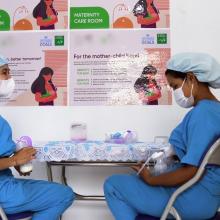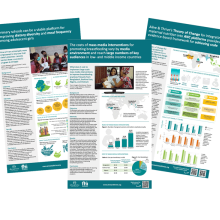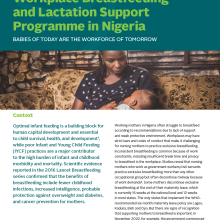Journal article
Jan 13 2023

Differences in the Microbiological Profile of Raw and Pasteurized Breastmilk from Hospital and Community-Based Donors at the First Human Milk Bank in Vietnam (Tran HT, Nguyen TT, et al, Nutrients. 2023)
Microbiological quality is one of the key safety standards in human milk bank operations.
Video
Jan 12 2023

VIDEO: An introduction to Workplace Lactation Support programs
Some mothers who would like to continue breastfeeding are forced to stop so that they can return to work. Workplace Lactation Support programs are an effective way to address this problem.
Presentation
Jan 12 2023

Adolescent nutrition, maternal nutrition theory of change and media costs posters presented at the SBCC Summit
Three posters on mass media costing, scaling up maternal nutrition, and school-based nutrition highlight results from some of Alive & Thrive's implementation research in Africa and Asia. They were shared at the 2022 SBCC Summit in Marrakech, Morocco, in December.
Journal article
Jan 10 2023

The Financial Costs of Mass Media Interventions Used for Improving Breastfeeding Practices in Bangladesh, Burkina Faso, Nigeria, and Vietnam (Sanghvi T.G., et al, 2022)
This analysis documents the financial costs and budgetary needs for implementing mass media components of large-scale breastfeeding programs, providing annual costs, cost structures, and coverage achieved through mass media interventions in four low- and middle-income countries.
Brief
Dec 15 2022

Workplace Breastfeeding and Lactation Support Program in Nigeria
This toolkit was developed based on lessons learned from a pilot workplace breastfeeding/lactation support program with the Nigeria Employers’ Consultative Association (NECA) Network of Entrepreneurial Women (NNEW) and other
Journal article
Nov 15 2022

Multiple modifiable maternal, household and health service factors are associated with maternal nutrition and early breastfeeding practices in Burkina Faso (Kim Sunny S, Ouédraogo C, 2022, Mat & Child Nutrition)
This study identified factors that can be modified by interventions at the individual, household and health service levels to improve maternal nutrition and breastfeeding practices in Burkina Faso: High maternal knowledge was an important factor for maternal dietary diversity, breastfeeding and I

